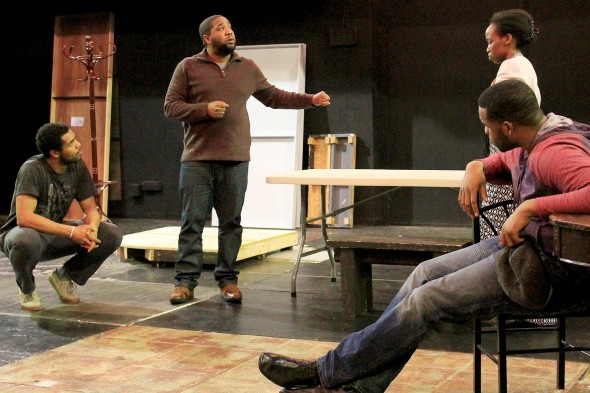‘Piano Lesson’ a brilliant mix of philosophy, comedy
By Johnson Luo — zluo20@uic.edu
UIC Theatre’s production of “The Piano Lesson” reflects this theater season’s theme of “What would you fight for?” — exploring questions and social psychological phenomena on values.
“The Piano Lesson,” written by August Wilson and directed by Derrick Sanders, tells the story of a beautiful and historic piano. Descendants of a slave once owned by a European settler inherited it after the abolition of slavery.
Bernice has the piano in her boyfriend Doaker’s house in Pittsburgh. But her brother, Boy Willie, has just as much right to the piano as she does. Boy Willie travels with his friend, Lymon, to Pittsburg, intending to sell the piano for money to buy farmland. Bernice refuses to sell the piano because it holds too much sentimental and historic values. This is the main conflict of the story: Should they sell the piano?
An interesting philosophical question surfaces frequently throughout Wilson’s work: Is our past a positive or negative force in our lives? Bernice wants to keep the piano for no other reason than its intangible value, but she still struggles. Selling the piano would make Boy Willie happy for the profit, a tangible value.
Avery, a preacher who fancies Bernice, wants her to play the piano. She refuses because of her traumas related to the piano — a struggle caused by one’s past. But the intangible value of the past does undeniably hold worth — it serves as a source of pride and identity.
The piano is also haunted by a ghost, symbolism for the burden of the past.
The play invites its audience to think about the impact of the past on their own lives, too.
“The Piano Lesson” includes rich artistic elements, which add ample shades of vivid colors to the perhaps relatively dull philosophical sketch. The musical elements and comedy stand out. The jazzy tunes imprinted the set, characters and even their voices on my mind.
Comic relief regulates the rhythm of the play. Jokes keep the audience engaged but relaxed. A good one: “We bought the truck for 120 dollars. We ain’t telling you how we got the 120 dollars, but we bought the truck honest.”
The play resolves in a slightly abrupt fashion, which leaves the audience questioning some of the characters’ motivations for their decisions.
The play, its design and the actors and actresses were absolutely brilliant.
As an art form, acting warps space and time. We’re all trapped in our own lives, with relatively regular schedules and closed spaces. But acting, and acting alone, allows us to peek inside other people’s closed spaces and unique minds. UIC Theatre has its very own rendition of this human ingenuity.

